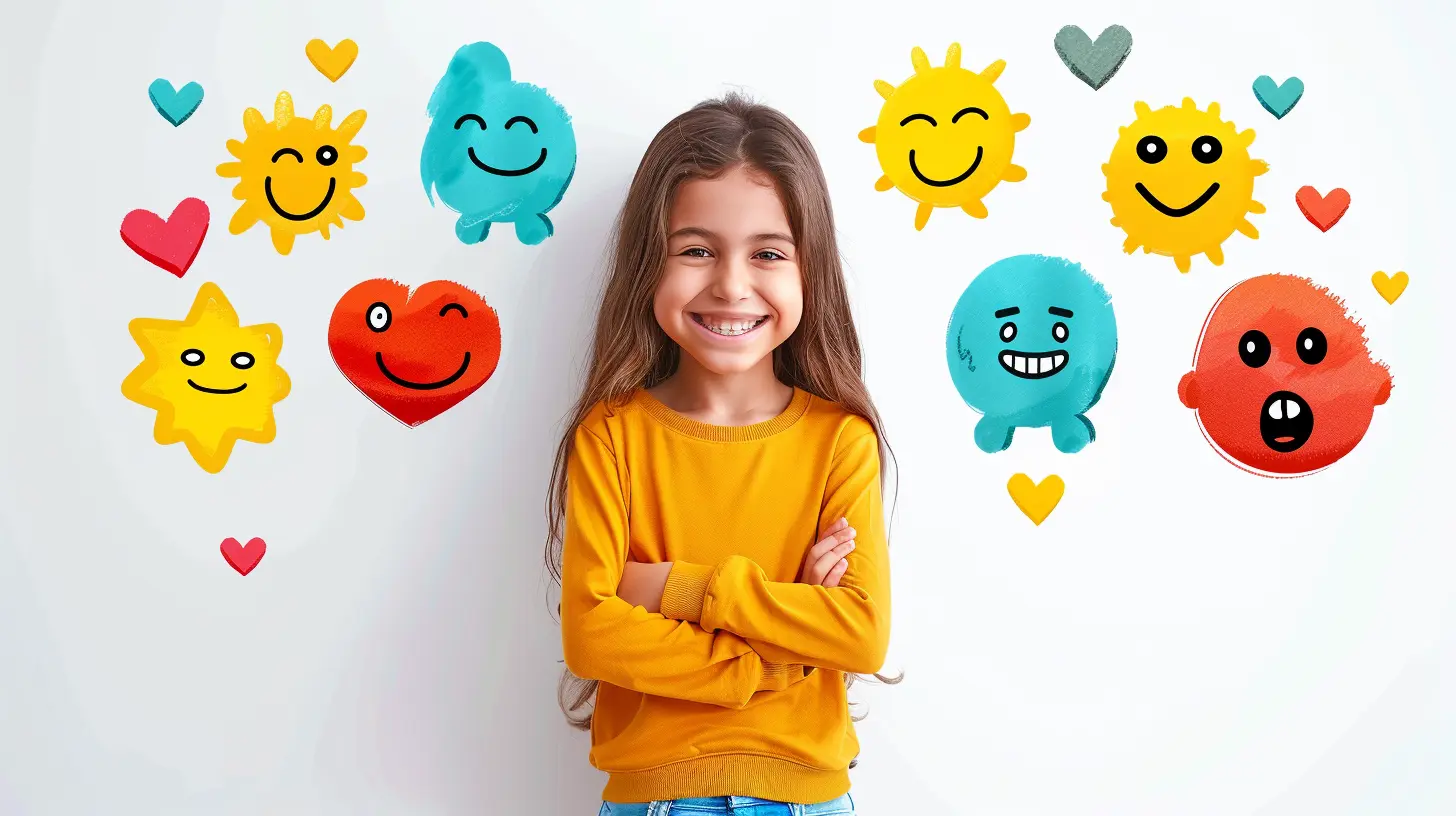How to Support Your Child Through Big Emotions
19 April 2025
Parenting is a roller coaster. One minute, your child is giggling uncontrollably at a fart joke, and the next, they're lying on the floor wailing like you've just told them ice cream is illegal. Sound familiar? If so, welcome to the world of big emotions, where little humans experience feelings as intense as a season finale of your favorite drama series.
So, how do you help your child navigate through these emotional storms without losing your sanity? Buckle up, because we're about to dive into the wonderful (and sometimes exhausting) world of child emotions—and how to handle them like a pro. 
Understanding Big Emotions in Kids

What Are "Big Emotions"?
Big emotions aren't just a toddler thing. They pop up at all ages—toddlers, preschoolers, and even that brooding teenager who insists they're "fine" while sulking in the corner. These feelings include:- Anger ("I CAN’T BELIEVE YOU CUT MY SANDWICH THE WRONG WAY!")
- Frustration ("I tried to tie my shoes once and it didn’t work, so I’m quitting life.")
- Sadness ("The goldfish died, and I’m never eating again.")
- Fear ("What if there’s a monster under my bed?")
- Excitement ("I get cake for breakfast?! Wait, no? WHY DO YOU HATE ME?")
Kids feel emotions HARD. The challenge? They often lack the tools to express them appropriately. And when words fail, meltdowns, mood swings, and the occasional shoe thrown across the room commence.
Why Do Kids Struggle with Big Feelings?
Think about it—adults have years of experience dealing with emotions, and we still lose it sometimes (hello, road rage and frustrating Wi-Fi problems). Now, imagine having all these overwhelming feelings but none of the skills to handle them. That’s where kids are.Their brains are still developing. Specifically, their prefrontal cortex, the part responsible for emotional regulation, is a work in progress. They need guidance, patience, and a lot of deep breaths (from both of you). 
How to Support Your Child Through Big Emotions
1. Stay Calm (Even When You Want to Scream)
Easier said than done, right? But kids are like emotional sponges—they soak up whatever vibe you're putting out. If you lose your cool, their meltdown will only intensify.Try this: Pretend you’re a detective. Instead of reacting emotionally, investigate. What triggered the meltdown? Hunger? Tiredness? That tricky shoelace? Keeping your own emotions in check teaches them that even in chaos, calm is possible.
2. Validate Their Feelings
Ever been upset and had someone say, “Relax, it’s not a big deal”? Annoying, right? Kids feel the same way. Instead of dismissing their emotions, validate them:❌ Wrong: "Stop crying, it's just a broken crayon!"
✅ Right: "I see you're really upset about your crayon breaking. I know that can be frustrating."
Validation doesn’t mean agreeing with unreasonable behavior—it just means letting them know their feelings matter.
3. Help Them Name Their Emotions
Many kids don’t have the vocabulary to express what they’re feeling, so helping them put words to emotions is a game-changer.Instead of them screaming, "I HATE EVERYTHING!" try:
🔹 "It sounds like you're feeling really frustrated right now."
Over time, they'll start using words instead of tantrums (hallelujah!).
4. Teach Healthy Ways to Express Feelings
If throwing Legos is their current go-to coping skill, it may be time to introduce some better options:- Deep breaths (teach them to "smell the flower, blow out the candle")
- Squeezing a stress ball (or, let’s be real, a stuffed animal works too)
- Journaling or drawing (because words are hard sometimes)
- Hitting a pillow instead of a sibling (small wins, people!)
Giving them tools helps them manage emotions in a way that doesn’t involve destruction.
5. Model Emotional Regulation
Newsflash: Kids are always watching. If you handle frustration by slamming cupboard doors, guess what they’ll do?Show them what regulation looks like:
- Take deep breaths when you’re overwhelmed.
- Say out loud, “I’m feeling frustrated, so I’m going to take a minute to calm down.”
- Use humor to diffuse tension ("I feel like a grumpy bear right now—maybe I need a snack!").
When they see you managing emotions like a champ, they’ll start mirroring those behaviors.
6. Create a "Calm-Down Corner"
Instead of sending them to time-out (a.k.a. the tantrum dungeon), set up a calm-down corner—a cozy area with pillows, fidgets, coloring books, or calming music.When they feel overwhelmed, they can go there to regroup. This teaches self-soothing instead of just punishment.
7. Offer Comfort, Not Consequences (During the Meltdown)
When your child is in full meltdown mode, they aren’t thinking logically. Trying to reason with them mid-scream is like negotiating with a raccoon who found your snacks—pointless.Instead of saying, “If you keep crying, you’re losing screen time,” try:
✔️ “I’m here for you. When you're ready, we can talk.”
Once they’re calm, then you can discuss expectations and better ways to handle emotions next time.
8. Help Them Recognize Their Triggers
Does their mood shift after a long day? Do they unravel when they’re hungry? Helping them identify what sets them off can prepare them to manage emotions better.For example:
- If hunger fuels their tantrums, always have snacks on hand.
- If transitions are hard, give them warnings (e.g., “In five minutes, we’re leaving the park”).
Awareness allows you to proactively prevent meltdowns.
9. Praise Effort, Not Just Outcome
When they successfully handle emotions in a better way—even if it’s small—praise them!💡 Instead of: "Good job not crying!"
Say: "I saw how you took deep breaths when you were frustrated. That was great self-control!"
Encouragement builds their confidence in emotional regulation.
10. Teach the Power of "Do-Overs"
Sometimes, kids mess up. (Shocking, I know.) When they lash out, instead of just punishing them, offer a redo.✔️ "I know you were upset. Want to try telling me how you feel in a calmer way?"
This gives them a second chance to practice handling emotions appropriately. 
The Takeaway: You're Doing Great (Even If It Feels Like Chaos)
Helping your child navigate big emotions is no small feat. It takes patience, consistency, and a lot of deep breaths. But remember: you're raising a human, not a robot.There will be meltdowns. There will be eye rolls. But there will also be progress, and every small victory counts.
So, celebrate the small wins, give yourself grace, and know that you're shaping a future adult who will one day (hopefully) handle their emotions like a pro. And if all else fails, there's always coffee. Lots and lots of coffee.
all images in this post were generated using AI tools
Category:
ParentingAuthor:

Jenna Richardson
Discussion
rate this article
4 comments
Jade Fletcher
Navigating big emotions is like herding cats on roller skates! Embrace the chaos, unleash the confetti, and remember: every outburst is just a tiny Picasso, splattering feelings on the canvas of their heart. 🎨❤️
May 20, 2025 at 1:37 PM

Jenna Richardson
Absolutely! Embracing chaos and celebrating those emotions is key to supporting our kids. Every expression is a step toward understanding their hearts. 🎉❤️
Hattie Kim
“Big emotions? Pass the snacks!”
May 6, 2025 at 3:18 AM

Jenna Richardson
Snacks can be comforting, but let's also focus on understanding and validating those emotions!
Talis Kline
This article offers valuable insights into helping children navigate intense emotions. By fostering open communication, practicing empathy, and modeling emotional regulation, parents can create a supportive environment that empowers kids to understand and manage their feelings. Great read!
April 23, 2025 at 2:59 AM

Jenna Richardson
Thank you for your kind words! I'm glad you found the insights helpful for supporting children through their emotions.
Samantha White
Thank you for sharing such valuable insights on supporting children through intense emotions. Your practical tips and understanding of emotional development are incredibly helpful for parents navigating these challenges. It's a reminder that our presence and empathy can make a significant difference in their emotional wellbeing.
April 22, 2025 at 4:15 AM

Jenna Richardson
Thank you for your kind words! I'm glad you found the tips helpful—empathy truly is key in supporting our children through their emotional journeys.



